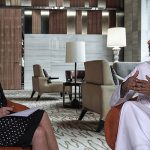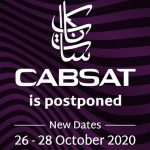The two-day virtual exhibition and conference is being held under the theme ‘curating and delivering limitless must experience content’ and launched its conference agenda packed with industry-leading content experts.
CABSAT.Virtual, the Middle East and North Africa’s first-ever virtual event for the broadcast, satellite and content communities, today hosted the first day of its virtual platform which has unified the entire content journey, from content creation to production and distribution.
Following the decision to move the physical edition of CABSAT to May 24-26, 2021, CABSAT.Virtual is providing an opportunity to engage with the full broadcast and satellite industry ecosystem, to meet qualified, influential buyers, network with decision-makers and pitch businesses from anywhere in the world.
The two-day virtual exhibition and conference, which today hosted attendees from 113 countries, is being held under the theme ‘curating and delivering limitless must experience content’ and launched its conference agenda packed with industry-leading content experts.
CABSAT.Virtual’s exhibitors and visitors have access to a digital platform encompassing a range of high-tech features, delivering a frictionless event experience. An AI-powered matchmaking engine is matching businesses with potential buyers for video calls and chat on the virtual platform, while exhibitors are presenting their products virtually.
Thomas Loffler, AVP, Exhibitions and Show Director, CABSAT, said, “Virtual connections are so important in these unprecedented times, and CABSAT.Virtual presents a unique opportunity to engage with world-class speakers, attendees and experts. However, we believe live, in-person meetings are irreplaceable, and we look forward to welcoming you to CABSAT from 24th-26th May 2021 at Dubai World Trade Centre.”
Majed Al Suwaidi, Managing Director, Dubai Media City, Dubai Studio City, and Dubai Production City, kicked off CABSAT.Virtual’s Content Congress agenda by discussing how Dubai, the ‘Arab media capital of 2020’, is driving media excellence in the region and making Arab media a source of hope and optimism for the future.
In the regional keynote, Al Suwaidi said: “Dubai’s creative industries demonstrated readiness and resilience to support the UAE and wider region during these exceptional times. By challenging misinformation, reporting the facts and keeping millions of people informed and entertained, the media industry highlighted its importance as a sector of social and economic importance. Our three media communities – Dubai Media City, Dubai Studio City and Dubai Production City – have played a major role in creating a comprehensive ecosystem in line with the vision of our leaders for knowledge and innovation-based economy.
“We have attracted major Hollywood blockbusters such as Vanguard, Star Trek Beyond and Mission: Impossible Ghost – Protocol to Dubai. Our startup incubator in5 has helped entrepreneurs raise record-breaking investment this year. GoFreelance has provided opportunities for freelancers and we continue to be a hub for some of the world’s leading media organisations.”
With Africa’s cultural yield having tremendous potential economic and social impact, CABSAT.Virtual heard expert insight on ways to forge regional alliances while developing localised content strategies, from Aduku Armstrong Idachaba, Director General, National Broadcasting Commission Of Nigeria.
Idachaba said: “Africa perhaps remains the biggest hub of creative content globally. Nigeria’s songs, dances and drama show narratives and renditions which have become globalised and have helped to sell a central African identity point. We believe the world is beginning to recognise Africa for its content. It’s not surprising that Nigeria has been the biggest cultural melting point in Africa. Many global musical icons are from Nigeria, while Nollywood has been gaining audiences across Europe and America – and the world. TV and radio are also growing exponentially, giving traction to our culture. I implore CABSAT visitors to forge alliances with Africa.”
Three-time Emmy award-winning digital series creator and short form and interactive creator, showrunner, and storyteller Bernie Su explored new and innovative ways to engage audiences through story experiences. He discussed his Twitch series Artificial, which follows the development of an AI ‘being’ and is the only scripted original on the platform.
Su said: “The series is complex and incredibly challenging to produce, but we aim to make it feel seamless. It’s designed specifically for the technology on Twitch. It’s interactive because the viewer has two touchpoints – Twitch Chat where they can interact with the show’s AI being a character. They can also interact through polls, where the audience is ‘consequential’ – where there are direct consequences of audience decisions. At any given moment, the characters may not be responding but the audience can influence the story’s outcomes.”
CABSAT.Virtual also heard from a panel of experts on how OTT services can retain newly recruited subscribers following a surge in engagement and new subscriptions since the start of the pandemic.
“We saw an opportunity and launched the OSN Streaming app and brought Disney+ into the region – people have jumped on it and we’ve seen an increase in engagement and new subscribers,” said Zahra Zayat, SVP-Digital, OTT & Telco, OSN. “People will stay on the platforms as long as there is something they are willing to watch – we’ve brought in content at a similar time to the theatrical releases. It requires huge activity to keep audiences on the platform and to keep them engaged.”
“When the pandemic started to have an impact, we had to check if we could commit to the same levels of revenue and subscribers,” remarked Nadine Samra, Chief Business Officer, Weyyak, Zee Entertainment. “What actually happened was we saw traffic going up – even though we reduced expectations, we saw traffic growing. Users have consumed more content and increased average viewing times. A lot of our focus is on the advertising side. When it comes to the churn of subscribers, it’s low for us because people know why they’re subscribing – we have a big library of content that Arabic audiences really like, and all of our content is only available on Weyyak.”
“Metadata has become so much more important,” said Geet Lulla, Managing Director, India, Middle East and South-East Asia, Gracenote. “Everyone with a decent size smartphone in their pocket can watch what they want to, where they want to. Consumers have realised there is more choice available. It’s important for OTT providers to provide personalisation and more quality content, which requires more metadata.”
“The pandemic took us from a healthy growth situation to turbocharged growth,” said Luis Duran, Chief Commercial Officer, Shahid. “In a way, the virus accelerated certain behaviours, like the willingness to pay for content. A lot of people got used to paying for our services – there’s been a massive increase in the willingness to pay. We’re trying to stay at the level of the new normal – subscribers are staying, now they have two or three services and in terms of engagement you can’t expect people to stay in front of the TV for five hours, but I believe we will sustain similar levels.”
David Meltzer, Secretary-General, GVF, the global trade association for the satellite industry, and Mehtap Dufour, Senior Radiocommunication Engineer, discussed how satellite-related outcomes of WRC-19 have influenced the MENA region and WRC-23’s key and pivotal satellite-related agenda items.
Mehtap Dufour, Senior Radiocommunication Engineer, ITU said: “The key outcome of the WRC-19 was the decision to connect people via geo-stations and satellites, which will increase communication. The protections being accorded to Earth exploration satellite service are very important for monitoring earth’s atmosphere, supporting meteorology and climatology.”
Meltzer also hosted a panel discussion on satellite’s disruption both in orbit and on earth, featuring Dave Rehbehn, Vice President, International Division, Hughes; Simon Gray, Senior Vice President of Civil Government, Eutelsat; Imran Malik, Vice President, Global Sales, Fixed Data, SES; and Michele Di Paolo, Director of Business Development, SpaceBridge.
Meanwhile, Rami Zeidan, Head of Video and Creative, TikTok, discussed the rise of short-form video content, and how to engage Arab audiences and inspire creativity in a unique and participatory way, as well as how cultivating creative expression helps creators develop diverse and authentic short-form video content.
“It’s more of a video editing tool than anything else. It’s no longer about how many followers you have – anybody with good talent can become a popular creator. We’re merging the best of the social media world and the best of the streaming world and putting it in one place. We say the only rule is abiding by TikTok’s safety rules, but beyond that, there are no rules for what you can do – that creates a lot of firsts,” Zeidan noted.
Moon Baz, Strategic Partner Manager, Facebook MENA and Jason Monteiro, Director Brand and Communications, Shahid explored the role of social media content during the COVID-19 pandemic as well as the potential for partnerships between social media platforms and content producers.
“The kind of content that broadcasters can provide can often go viral and helps to engage people. It sparks interest for people to go back to TV channels to watch more of a show. We’re looking to expand across MENA with other publishers and are looking for exclusive content that can spark interest,” Baz said.
On the other hand, Monteiro remarked: “Is Facebook a competitor in some of our lines of businesses? Yes, but the reality is that in the modern world of digital, you have to collaborate and co-create, and I believe the pie is big enough to be shared. Facebook and social media allow us to reach an audience that we can’t otherwise access.
“No matter how big your audience is, you will always be limited, and social media platforms provide an extension of what you are able to achieve. We see it as a way to improve our platform. We want to reach new geographies and age groups that we haven’t reached yet. Our primary advantage is that we are the broadest and deepest home of Arabic content in the MENA region. More and more consumption is moving to digital – if you don’t evolve and make it one of your primary tools, you will miss out on new viewers.”
In the session focussed on 5G, Yusuf Al-Butti, Head of Technology and Engineering, twofour54, discussed what consumers will expect from 5G entertainment and the new revenue models that will generate change.
He said: “5G will change our lives and affect many day-to-day applications. The world will change and become more interactive with the establishment of 5G infrastructure. There is now more storage, better processing and faster communications – that will make the impossible possible. It will connect broadcasters to viewers in new ways across gaming, film and TV.”















































































